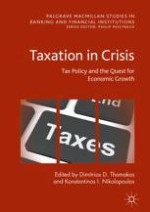
2017 | OriginalPaper | Chapter
1. Taxation and Rebellion: A Historical and Philosophical Perspective
Author : Jane Frecknall-Hughes
Published in: Taxation in Crisis
Publisher: Springer International Publishing
Activate our intelligent search to find suitable subject content or patents.
Select sections of text to find matching patents with Artificial Intelligence. powered by
Select sections of text to find additional relevant content using AI-assisted search. powered by